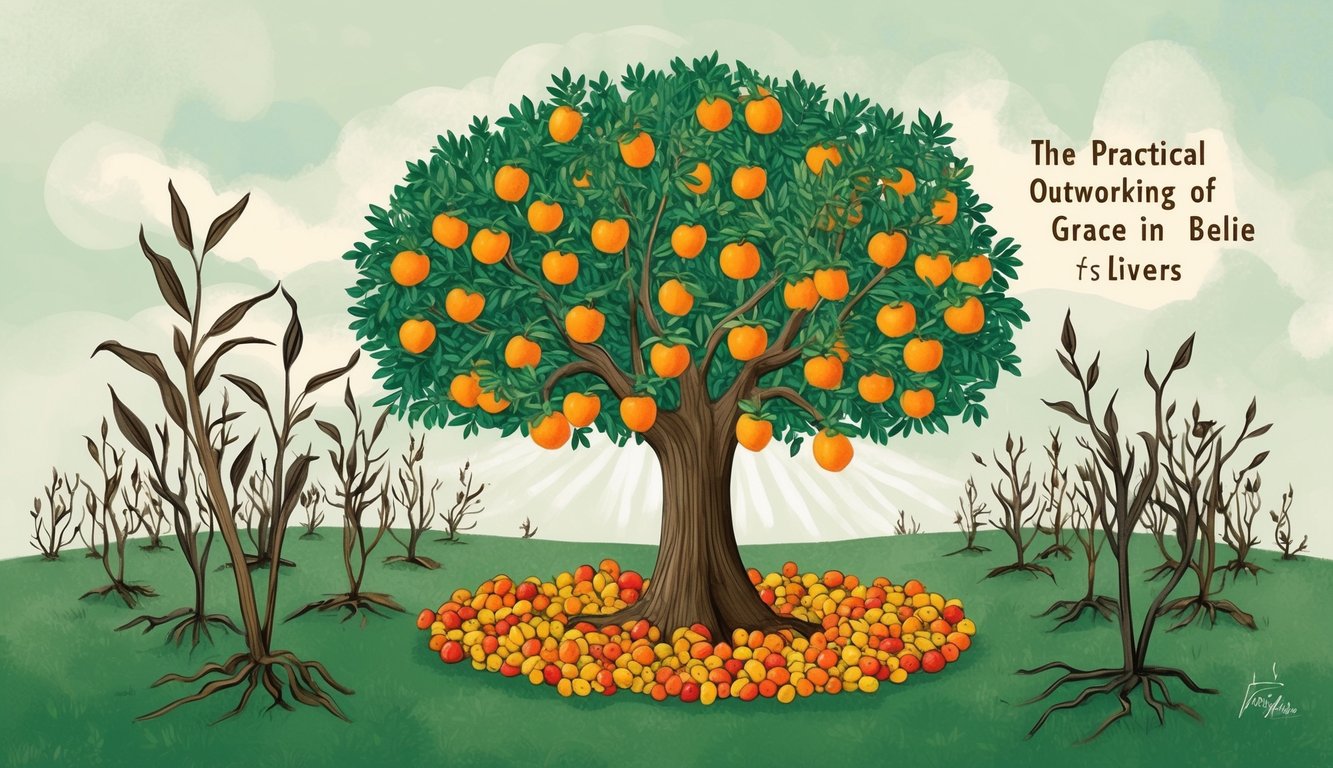Don’t Miss Out On This Unique Astrological Opportunity
Are you tired of spinning your wheels and getting nowhere? Simply put, you’re out of sync: you’re out of alignment with your astral configuration.
But: there’s a kind of map that can help you reclaim your alignment. Think of it as your own personal blueprint to success and happiness: a blueprint that will help you live your most amazing life.
Get started here.
Grace is a central theme in Christianity, often described as God’s unmerited favor.
Through scriptures, you can discover how grace is more than just a concept.
It is a powerful force that saves, transforms, and empowers believers.
Grace is the divine gift that allows you to experience salvation and a deeper relationship with Jesus Christ.
In the Bible, grace is seen as a transformative power that enables believers to live holy lives and share God’s love with others.
By exploring verses on grace, you begin to see its practical role in your everyday life, guiding your actions and enriching your faith.
This grace is not just an abstract idea but an active presence that supports and encourages you in your spiritual journey.
Understanding scriptures about grace can give you hope and assurance in times of uncertainty.
It’s a reminder of the eternal love and mercy that God offers, encouraging you to have confidence in your faith.
By reflecting on these verses, you connect more deeply with the core message of the Gospel and find strength in knowing you are part of this divine promise.
Key Takeaways
- God’s grace offers you salvation and a deeper connection with Jesus Christ.
- Grace empowers you to live a holy and loving life.
- Scripture on grace provides hope and confidence in your faith journey.
Defining Grace in the Christian Faith
Grace in Christianity is the generous gift of God’s love and mercy.
It’s considered unearned and freely given, a central theme in many parts of the Bible.
You will explore how grace is perceived both in the Old and New Testaments, capturing its timeless significance and impact on believers.
Old Testament Perspectives on Grace
In the Old Testament, grace is demonstrated through God’s actions and promises.
From the beginning, you encounter moments where God’s grace is evident.
For example, in Genesis, God shows grace to Noah by sparing his family during the flood due to Noah’s faithfulness.
Even when laws were given, like the ones through Moses, grace was present as God continued to show mercy to His people, forgiving their mistakes repeatedly.
The Old Testament often highlights God’s grace as a redeeming love that offers hope in times of trial and supports the growth of one’s faith.
This foundational understanding of grace sets the stage for deeper revelations later in the New Testament.
New Testament Revelations of Grace
In the New Testament, grace finds its fullest expression through Jesus Christ.
Its presence is strongly highlighted in the teachings and life of Jesus, emphasizing that grace is the bedrock of salvation.
You will see how this gift represents both divine mercy and love for all, regardless of their past actions.
Through Jesus, grace becomes a pathway to redemption, offering hope and a new beginning for believers.
Passages throughout the New Testament, like those in Romans and Ephesians, illustrate how grace transcends the law and paves the way for faith-driven salvation.
The New Testament also affirms that grace is not just a past event but a continual act of support and empowerment in a believer’s life.
The Manifestation of Grace Through Jesus Christ

Grace is often seen as a gift from God, embodied fully in the life of Jesus Christ.
Throughout his time on earth, Jesus showed grace in his actions, words, and the ultimate sacrifice he made for humanity.
This grace enables forgiveness of sins and provides strength for believers to live righteous lives.
Grace and the Life of Christ
In Jesus’ life, grace was evident in many ways.
As described in John 1:14, He came to us full of grace and truth.
He healed the sick, fed the hungry, and forgave those who wronged Him.
Grace was not just in His teachings; it was in every act of kindness and love.
Through these actions, Jesus provided a powerful example for how you can practice grace in your own life.
Acts 4:33 highlights the apostles’ mission to spread this grace found in Jesus.
By teaching about Jesus, they showed that grace is available to everyone and not earned.
It is a generosity from God that continuously flows, allowing you to receive grace upon grace as explained in John 1:16.
The Crucifixion and Resurrection
The crucifixion of Jesus is the ultimate manifestation of grace.
He willingly went to the cross to bear the sins of the world, offering forgiveness and salvation.
In this selfless act, the gift of grace became accessible to all.
The resurrection demonstrated that grace conquers sin and death.
As mentioned in Romans 5:20, where sin increased, grace abounded even more.
This shows strength in overcoming sin and achieving eternal life.
By Jesus rising from the dead, a promise is made that grace is indeed sufficient.
It empowers you to live free from the weight of sin, knowing that you can always seek forgiveness.
Living Under Grace
Living under grace means you rely on this divine gift in your daily life, drawing strength and courage from it. Ephesians 1:6 speaks of how believers are accepted through the grace of Jesus.
This acceptance is not through actions, but by faith in His sacrifice.
Titus 2:11 states that the grace of God brings salvation.
This influences every aspect of your life.
It teaches you to live in a way that reflects the kindness and mercy of Jesus.
With this grace, you can find the righteousness of Jesus as your guide, leading to a life full of purpose and meaning.
The Practical Outworking of Grace in Believers’ Lives

Grace is more than a concept; it’s a dynamic force in your life.
It influences daily actions, enhances your spiritual gifts, and supports you during hardships.
Here’s how grace can be a concrete part of your daily walk.
Grace in Daily Conduct
Grace shapes how you act every day.
It empowers you to live with love and kindness toward others.
As seen in Ephesians 2:8, grace is a free gift from God, not something you earn.
You are called to be humble instead of proud, as God opposes the proud but gives grace to the humble (James 4:6).
This grace leads to peace and allows you to navigate life with a heart of compassion and generosity.
Spiritual Gifts and Service
Your spiritual gifts, given by grace, are tools for service.
Each believer, under grace, receives unique abilities to serve others and build the community. 1 Peter 4:10 encourages you to use these gifts as acts of love and service.
Grace enables you to give without expecting anything back.
It empowers you to teach, comfort, and support those around you.
This expression of grace helps in the sanctification and edification of the body of Christ, forming a beloved community.
Grace During Suffering and Weakness
Grace offers strength and sufficiency during hardships. 2 Corinthians 12:9 states, “My grace is sufficient for you, for my power is made perfect in weakness.” When you face trials, grace provides the power to endure and grow.
You can approach the throne of grace with confidence, especially during struggles, as mentioned in Hebrews 4:16.
This grace turns suffering into an opportunity for growth and strength, making you resilient and hopeful.
Grace and Eternal Hope
Grace offers you the promise of eternal hope through faith and the assurance of salvation.
This grace, as described in scriptures, plays a crucial role in your spiritual journey.
The Promise of Grace Beyond Life
Grace assures you that life extends beyond earthly existence.
Acts 15:11 reminds you that you are saved by the grace of the Lord Jesus.
This grace promises eternal life, a gift beyond human works or efforts.
Jesus’s sacrifice and resurrection show you the ultimate expression of grace, paving the way for eternal hope.
In Revelation, grace is depicted as a powerful force that overcomes sin and death.
Grace leads you toward sanctification, a process where you’re made holy and prepared for everlasting life.
Through grace, you receive strength and hope to face life’s challenges, knowing there is a future beyond present struggles.
Grace and the Assurance of Salvation
Grace ensures your salvation, providing peace and confidence in your faith.
Romans 11:6 emphasizes that salvation comes through grace, not human deeds.
You are justified by grace, meaning your sins are forgiven, and a new life is promised to you.
This offers a deep sense of security and hope.
The teachings in Hebrews 2:9 highlight Jesus’s role in your salvation journey.
By experiencing death, He brings life through grace.
As described in Acts 20:24, grace empowers you to fulfill your purpose and embrace the hope of salvation.
Grace remains sufficient and gives you dominion over sin, as mentioned in Romans 6:14, reinforcing your assurance of eternal life.
Frequently Asked Questions

In the Bible, grace is a recurring theme that reflects God’s kindness and mercy.
It is often illustrated through various scriptures that highlight God’s favor, forgiveness, and transformative power.
What are some key verses about grace and favor in the Bible?
Important verses on grace include Ephesians 2:8-9, which tells you that it is by grace you are saved through faith.
Another key verse is 2 Corinthians 12:9, where God says His grace is sufficient for you.
How do the Psalms describe God’s grace?
The Psalms often speak of God’s grace as a source of protection and love.
For instance, Psalm 84:11 mentions that God gives grace and glory, emphasizing His role as a provider and shield for those who walk uprightly.
This theme of divine grace is echoed throughout the Bible, reinforcing God’s unwavering care for His people.
Understanding Colossians 3:14 meaning further highlights the importance of love as the perfect bond that unites believers in faith and harmony.
Just as God’s grace shields and uplifts, love serves as the foundation of a Christ-centered life, drawing His followers closer to Him.
Can you give examples of grace demonstrated in the Bible?
One example is the story of the Prodigal Son, which shows a father’s forgiveness and acceptance.
Another is Jesus forgiving those who crucified Him, highlighting compassion and mercy as acts of grace.
What do the Scriptures say about grace and forgiveness?
The Bible links grace with forgiveness, as seen in 1 John 1:9, which assures you that if you confess your sins, God is faithful and will forgive you.
Grace allows you to receive forgiveness and start anew.
How is the concept of grace explained in the New Testament?
In the New Testament, grace is described as a gift from God that brings salvation and transformation.
Romans 5:15 talks about the gift of grace through Jesus Christ, offering you a path to eternal life.
In what ways does the Bible talk about the power of grace?
The Bible shows grace as empowering and life-changing.
For instance, in Titus 2:11-12, grace teaches you to live a life that reflects godliness.
Grace not only saves but also strengthens you to live according to God’s will.



